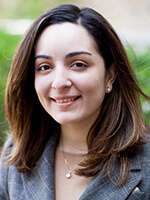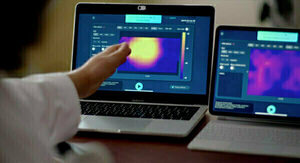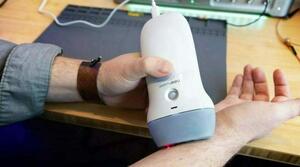Notre Dame postdoctoral scholar working to improve cancer diagnosis through groundbreaking technology
Karla Gonzalez Serrano, postdoctoral scholar for the University of Notre Dame’s Eck Institute for Global Health, has always wanted to join a team that helps doctors provide better care.

“There are a lot of physicians in my family, and I have always wanted to help them have the tools that they wish they had to provide better care in their communities,” Gonzalez Serrano explains.
As a graduate student at Tecnológico de Monterrey in Monterrey, Mexico, Gonzalez Serrano participated in a collaborative program with the University of Notre Dame’s College of Engineering. She received her Ph.D. in Electrical Engineering from the University of Notre Dame in 2022 and was then offered the opportunity to join the research team of Thomas O’Sullivan, associate professor of Electrical Engineering in the College of Engineering.
Gonzalez Serrano is testing NearWave, a wireless, handheld light-based imaging device recently developed by O’Sullivan and his then Ph.D. student, Roy Stillwell, to characterize breast abnormalities.
In early 2023, a partnership between the Eck Institute and the Harper Cancer Research Institute (HCRI) offered her the opportunity to receive additional support to extend the device's application toward global health concerns. In limited-resource settings, there is a dire need for an approach to screen and diagnose breast cancers without causing significant false positive results that would consume already scarce resources. NearWave is portable, easy to use, relatively low cost, and does not require significant infrastructure to function, making it ideal for use in under-resourced communities where it could aid in tumor diagnosis, potentially decreasing the volume of false positive indications.

Testing and refining the device’s imaging procedure is necessary to produce an interface that is easy for clinicians to use and interpret for rapid pre-screening of breast lesions in diverse environments.
Partnerships with healthcare facilities in the United States are planned for the initial pilot study that will help to optimize the imaging procedure. Then, the device’s usability and quality of imaging scans of patients from a Mexican hospital will be evaluated. After integrating any necessary improvements identified in the US and Mexico, the device will be tested in a marginalized community with limited access to health care. Gonzalez Serrano also hopes to perform a more extensive clinical study to assess and inform diagnostic thresholds for distinguishing benign and malignant breast lesions.

“We want this device to be effective and accessible to clinicians in various environments,” Gonzalez Serrano emphasizes. Her dedication to the project is inspired by personal commitments toward providing positive impacts in her home country of Mexico, “because in limited-resource settings like many of the rural communities in Mexico, this device could identify breast cancers at earlier, more treatable stages and help these communities’ limited health care systems provide better breast cancer care.”
Sharon Stack, who is the Ann F. Dunne and Elizabeth Riley Director of the Harper Cancer Research Institute, says she is pleased with Gonzalez Serrano’s work to advance NearWave’s application. She says, “As an early supporter of Tom O’Sullivan's basic research that enabled the development of the current NearWave device, HCRI is delighted to see this important product move into the clinic.” Stack, who is also the Kleiderer-Pezold Professor of Biochemistry for the Department of Chemistry and Biochemistry, explains that “early detection is by far the best way to improve cancer survival. Translation of this technology to low resource settings will mean that the opportunity to survive a cancer diagnosis can be significantly expanded in the medically underserved community.”
Gonzalez Serrano’s work as part of the O’Sullivan Research Group is essential for ensuring the device is properly tested before wider application in healthcare settings. “Postdoctoral scholars, like Karla Gonzalez Serrano, are critical for advancing translational research,” said O’Sullivan. “Creating the connection between the devices that are developed in the lab, and how they are used in health care settings, is what defines our work as a force for good.”
For more information about this project and about O’Sullivan’s biomedical photonics laboratory, please visit the O’Sullivan Research Group website.
Contact:
Christine Grashorn, Communications Specialist
Notre Dame Research / University of Notre Dame
cgrashor@nd.edu / 574.631.4856
research.nd.edu / @UNDResearch
About the Eck Institute for Global Health
The Eck Institute for Global Health (EIGH), an integral part of Notre Dame Research, builds on the University’s historical strength in infectious disease research, including vector-borne diseases, while broadening the interdisciplinary expertise into other key global health areas including maternal, newborn, & child health (MNCH), community health, mental health, nutrition and non-communicable diseases, the environment and health, health analytics and technologies, and health systems and organizations. Our team of interdisciplinary researchers and their students holistically address health disparities around the world. EIGH faculty affiliates recognize health as a fundamental human right and promote research, training, and service to advance health standards for all people, especially those in resource-poor countries who are disproportionately impacted by preventable diseases. The EIGH is training the next generation of global health researchers and leaders through undergraduate, Master of Science in Global Health, doctoral, and postdoctoral programs.
About the Harper Cancer Research Institute
Investigators in the Harper Cancer Research Institute (HCRI) are dedicated to conducting innovative and integrative research that confronts the complex challenges of cancer. Our programmatic structure fosters multi-disciplinary cancer research by promoting interactions among research groups with distinct expertise and by training early career scientists to work across scientific fields. Clinical partnerships provide key translational insight and strengthen the mission of discovery. Collaboration is a foundational principle of the Institute. Harper research teams are comprised of faculty from multiple departments within the College of Science, College of Engineering, and the College of Arts and Letters at Notre Dame in addition to IUSMSB faculty.
Originally published by at globalhealth.nd.edu on February 02, 2024.
Latest Research
- Brain tumor growth patterns may help inform patient care managementAssistant Professor Meenal Datta (University of Notre Dame/Wes Evard) A team of researchers from the University of Notre Dame, Harvard Medical School/Massachusetts General Hospital, and Boston University has developed a technique for measuring a brain tumor’s mechanical force and a new model to estimate how much brain tissue a patient has lost.
- Biseach Symposium Strengthens Cancer Research Partnership Between Notre Dame and University of Galway…
- Notre Dame announces new research collaborations with Ukrainian Catholic UniversitySeven faculty teams of collaborators from the University of Notre Dame (South Bend, Indiana, USA) and Ukrainian Catholic University (Lviv, Ukraine) have received grants from Notre Dame Global and Notre Dame Research to pursue…
- From reaction to resolution: The future of allergy treatmentTwelve-year-old Lauren Eglite was thrilled to attend a Notre Dame football game with her father, Erik, in 2017, even though her acute peanut allergy demands constant vigilance. She was even more excited when the stadium’s brand-new video board aired an NBC Fighting…
- New Study Highlights Mother-Child Link for Anemia in The GambiaAnemia is a "silent epidemic." It affects nearly 2 billion people globally, yet many people ignore its symptoms. Typically caused by the consumption of iron-deficient foods, anemia develops gradually. Its symptoms—such as fatigue, weakness, and shortness of breath—are frequently dismissed or misattributed.
- Megan McDermott joins ND–IBM Tech Ethics Lab as new Notre Dame directorThe Notre Dame–IBM Technology Ethics Lab, a critical component of the Institute for Ethics and the Common Good (ECG) and the Notre…












